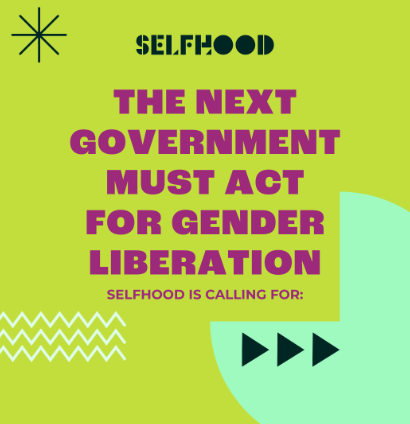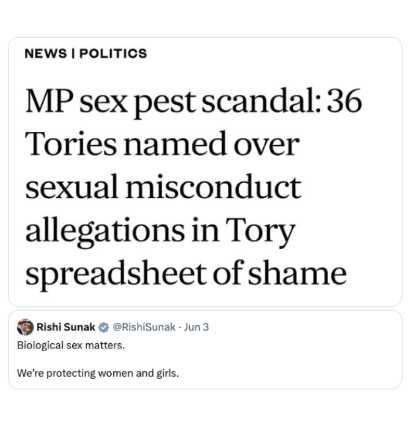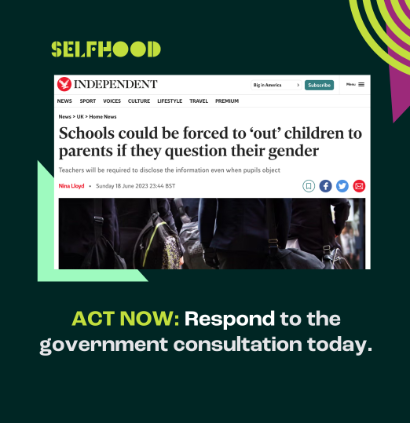Selfhood's Vital Calls for the Next Government: Ensuring Gender Liberation and Equality

With a new government on the horizon there is a real opportunity for progressive change. We have to make that opportunity a reality.
As the UK approaches a pivotal general election, our calls for the next government to end gender identity discrimination have never been more urgent.
At Selfhood, we believe your gender shouldn’t define who you are – you should. We fight for your right to define and experience gender however you choose, existing at the intersection of the feminist and queer liberation movements.
Gender identity discrimination is a systemic issue that demands collective action. Deeply entrenched gender norms and systemic inequalities hinder the realisation of genuine gender liberation. These dynamics display a clear power imbalance where certain groups, predominantly women, LGBTQ+ individuals, and gender-diverse communities, find themselves at the mercy of overarching systems and institutions. Our calls to the next government are bold and focused, designed to dismantle these systemic barriers and pave the way for a society where everyone, regardless of gender identity, can thrive.
1. End the Proliferation of Radical Misogyny in Classrooms
The first call is to end the proliferation of radical misogyny in classrooms. Radical misogyny, often perpetuated through online radicalisation, poses a significant threat to gender equality.
Education plays a crucial role in shaping the values and beliefs of young people - but teachers and parents need the tools to not just respond to what children and young people are watching online, but play a key role in preventing it from having an impact.
-
The Problem: Online Radicalisation
Misogynist extremists are radicalising boys and young men into an active - and ultimately violent - hatred of women and girls. Young people are increasingly exposed to harmful content that glorifies misogyny and fosters hatred. Often disseminated through social media platforms, this content can shape their attitudes and behaviours in dangerous ways. Together we can - and must - stop this radicalisation in its tracks.
-
Our Call: Better Education and Legislative Action
We call for comprehensive education in schools and teacher training on how radicalisation works online. This includes teaching students to recognise and critically evaluate harmful content, fostering digital literacy, and promoting values of respect and equality. Additionally, we demand the introduction of legislation and policies that require tech companies to take targeted measures to combat the rise of toxic misogyny and radicalisation on their platforms. Tech companies must be held accountable for the content they host and ensure their platforms do not become breeding grounds for hatred.
-
Why It Matters
Ending the proliferation of radical misogyny in classrooms is essential for creating a safe and inclusive educational environment - not just for students but also for teachers who are facing rising levels of misogyny from their students as a consequence of this content. By educating young people and their teachers and parents about the dangers of online radicalisation and holding tech companies accountable, we can prevent the spread of toxic ideologies and promote a culture of respect and equality. This is a crucial step towards ending gender identity discrimination and achieving true gender liberation.
2. Uphold the Equality Act (2010)
Our second call is to uphold the Equality Act (2010), landmark legislation that enshrines gender-based protections against discrimination. This act is a cornerstone of gender equality in the UK, and we must protect and strengthen it.
-
The Problem: Threats to Gender-Based Protections
Despite the protections offered by the Equality Act, there have been ongoing efforts from anti-trans campaigners to roll back these safeguards. These efforts threaten to undermine the progress we have made in combating gender identity discrimination and could leave many vulnerable to violence, discrimination, and harassment.
-
Our Call: Safeguarding and Strengthening Protections
We call on the next government to safeguard the gender-based protections enshrined in the Equality Act and oppose any attempts to weaken these protections. We welcome the commitments made in some party manifestos to do this. This includes ensuring robust enforcement mechanisms and providing adequate resources to support those who experience discrimination.
-
Why It Matters
Upholding the Equality Act is crucial for maintaining progress towards gender equality. By protecting and strengthening these legal safeguards, we can ensure that everyone, regardless of gender identity, is protected from discrimination and can live with dignity and respect. This is a fundamental step towards achieving gender liberation.
3. End Austerity
The third call is to put an end to austerity. Austerity measures have had a devastating impact on public services, healthcare, and education, exacerbating inequality and disproportionately affecting multiple marginalised communities.
-
The Problem: Inequality and Cuts to Essential Services
Austerity policies have led to significant cuts in essential services and produced some of the greatest inequalities,gender-based and otherwise, of recent times.
. Public services, healthcare, and education are vital for people from all walks of life to thrive and ensure equal opportunities for all. However, years of austerity have eroded these services, hitting women, communities of colour and children especially hard.
-
Our Call: Strengthen Public Services and Oppose Cuts
We call for a commitment to strengthen the mechanisms that combat inequality – public services, healthcare, and education – and to stand firm against any future cuts to these essential services. This includes childcare and equal parenting policies, meaningful funding for disability payments, investment in adult and children’s social care and more. These policies should be developed with women, people of colour and all politically marginalised people at its centre.
-
Why It Matters
Ending austerity is essential for addressing the root causes of inequality and creating a fairer society. By investing in public services and opposing cuts, we can ensure that everyone has access to the support they need to thrive. Austerity policies have unevenly and systematically cut crucial components of the welfare state, privatised core public services, implemented regressive tax regimes, and executed a benefits system that doesn’t believe people deserve support from the state.
4. Free Palestine
Our final call is for a free Palestine. The fight for Palestinian liberation is inherently interconnected with the global struggle for freedom and equality. We believe that true gender liberation cannot be achieved until all forms of oppression are dismantled, and this includes standing in solidarity with the Palestinian people.
-
The Problem: Global Struggles for Liberation
The Palestinian struggle for liberation is a poignant example of the broader fight against oppression and injustice. The systemic discrimination and human rights violations faced by Palestinians are part of a global pattern of inequality and occupation that affects marginalised communities everywhere. Gender liberation cannot be fully realised without addressing these interconnected struggles.
-
Our Call: Solidarity and Support for Palestinian Liberation
We call for an immediate ceasefire, solidarity and support for Palestine’s liberation.. This includes advocating for policies that promote peace and justice in Palestine, opposing actions that perpetuate oppression, and raising awareness about the interconnectedness of global struggles for freedom and equality.
-
Why It Matters
The fight for a free Palestine is integral to the broader struggle for gender liberation and equality. By standing in solidarity with the Palestinian people, we recognise that our liberation is tied to the liberation of all oppressed communities. We are not free until we are all free. This call emphasises the importance of global solidarity in our fight against gender identity discrimination and for true equality.
Conclusion
As we approach this critical election, Selfhood's calls for the next government are clear and imperative. We urge the next government to commit to ending the proliferation of radical misogyny in classrooms, upholding the Equality Act, ending austerity, and supporting the liberation of Palestine. These demands are essential for creating a society where everyone, regardless of gender identity, can live free from discrimination and oppression. Together, we can achieve true gender liberation and build a world where equality and justice prevail.
Be notified when we add new articles
Popular blog posts
-

-

-
 The real-world manosphere 1 Dec 2023
The real-world manosphere 1 Dec 2023 -
 Cards Against Misogyny 27 Nov 2023
Cards Against Misogyny 27 Nov 2023

